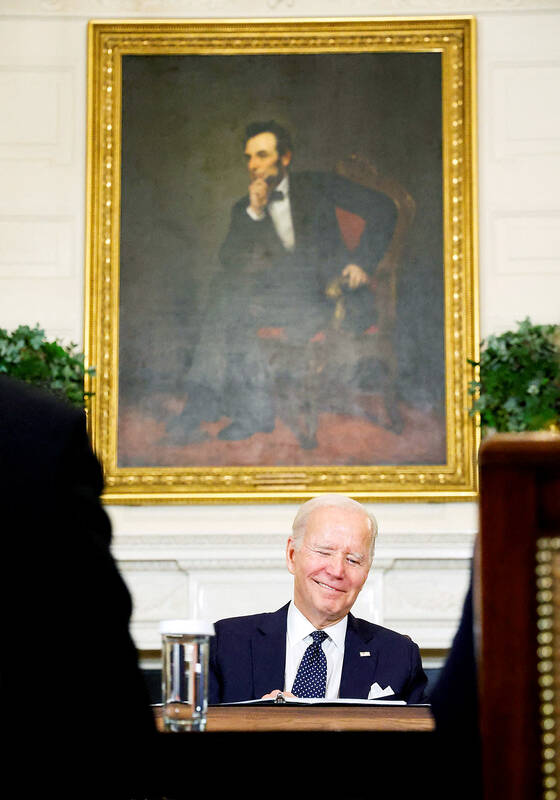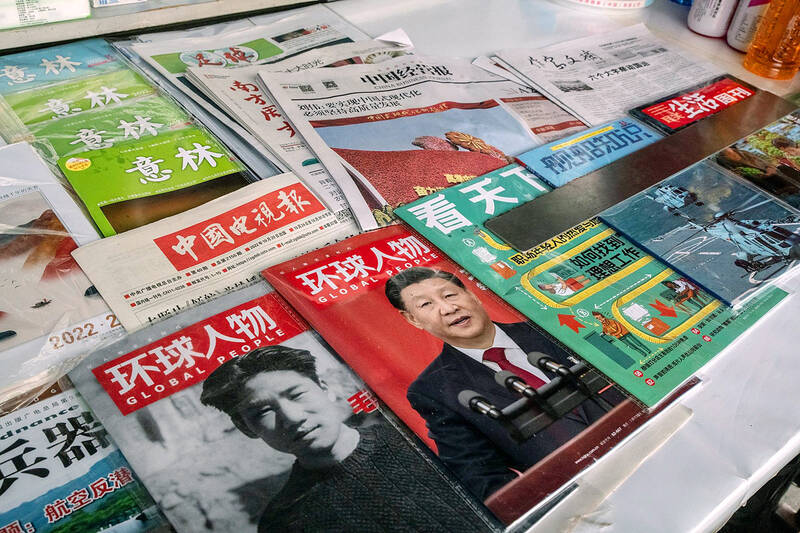Chinese President Xi Jinping (習近平) said his country is willing to work with the US to find ways to cooperate, comments that come before a potential meeting with US President Joe Biden at a G20 summit next month.
Better communication between the two nations would bolster global peace and development, Xi said in a letter to the Chinese National Committee on US-China Relations’ annual dinner on Wednesday, Xinhua news agency reported.
“China stands ready to work with the United States to find the right way to get along with each other in the new era on the basis of mutual respect, peaceful coexistence and win-win cooperation, which will benefit not only the two countries, but also the whole world,” Xi said.

Photo: REUTERS
The comments strike a conciliatory tone after a Chinese Communist Party congress during which Xi secured a norm-breaking third term and promised China would stand its ground in a more hostile world.
Xi’s remarks echoed his message last year to the same gala for the group, which aims to promote China-US cooperation. That event similarly came before a video summit with the US leader in November last year.
Still, Wednesday’s remarks signal an effort to maintain ties despite disputes over Taiwan, the semiconductor industry and Beijing’s response to Russia’s invasion of Ukraine.

Photo: Bloomberg
Speaking to US Department of Defense officials on Wednesday, Biden said that even as the US maintains its military advantage over China, “we’re making it clear that we don’t seek conflict.”
“There’ll be stiff competition, but there doesn’t need to be conflict,” he added.
Earlier this week, US National Security Council spokesman John Kirby said the Biden administration would “keep the lines of communication open, and that includes at the leader level.”
He said teams were still working on a possible meeting between Biden and Xi when world leaders gather at a G20 meeting in Bali, Indonesia, next month, in what would be Biden’s first talks with Xi as president.
Asked about a possible meeting between Xi and Biden, Chinese Ministry of Foreign Affairs spokeswoman Mao Ning (毛寧) yesterday said that she had no information on such plans.
The US Department of Commerce this month unveiled sweeping regulations that limit Beijing’s access to chips, the Biden administration’s most aggressive move to try to stop China from developing capabilities to challenge the US’ global technological dominance.
Xi, in turn, has pledged that his nation would prevail in its fight to develop strategically important technology.

A car bomb killed a senior Russian general in southern Moscow yesterday morning, the latest high-profile army figure to be blown up in a blast that came just hours after Russian and Ukrainian delegates held separate talks in Miami on a plan to end the war. Kyiv has not commented on the incident, but Russian investigators said they were probing whether the blast was “linked” to “Ukrainian special forces.” The attack was similar to other assassinations of generals and pro-war figures that have either been claimed, or are widely believed to have been orchestrated, by Ukraine. Russian Lieutenant General Fanil Sarvarov, 56, head

SAFETY FIRST: Double the number of police were deployed at the Taipei Marathon, while other cities released plans to bolster public event safety Authorities across Taiwan have stepped up security measures ahead of Christmas and New Year events, following a knife and smoke bomb attack in Taipei on Friday that left four people dead and 11 injured. In a bid to prevent potential copycat incidents, police deployments have been expanded for large gatherings, transport hubs, and other crowded public spaces, according to official statements from police and city authorities. Taipei Mayor Chiang Wan-an (蔣萬安) said the city has “comprehensively raised security readiness” in crowded areas, increased police deployments with armed officers, and intensified patrols during weekends and nighttime hours. For large-scale events, security checkpoints and explosives

PUBLIC SAFETY: The premier said that security would be tightened in transport hubs, while President Lai commended the public for their bravery The government is to deploy more police, including rapid response units, in crowded public areas to ensure a swift response to any threats, President William Lai (賴清德) said yesterday after a knife attack killed three people and injured 11 in Taipei the previous day. Lai made the remarks following a briefing by the National Police Agency on the progress of the investigation, saying that the attack underscored the importance of cooperation in public security between the central and local governments. The attack unfolded in the early evening on Friday around Taipei Main Station’s M7 exit and later near the Taipei MRT’s Zhongshan

REBUFFED: In response to Chinese criticism over recent arms sales, Washington urged Beijing to engage in meaningful dialogue instead of threats and intimidation Washington’s long-term commitment to Taiwan would not change, the US Department of State said yesterday, urging Beijing to stop pressuring Taiwan and engage in meaningful bilateral dialogues. The remarks came in response to a backlash from Beijing about Washington’s latest approval of arms sales to Taiwan. The US Defense Security Cooperation Agency said in a statement on Wednesday that the Taipei Economic and Cultural Representative Office in the US has asked to purchase an arms package, including Tactical Mission Network Software; AH-1W helicopter spare and repair parts; M109A7 self-propelled howitzers; HIMARS long range precision strike systems; tube-launched, optically tracked, wire-guided missiles; Javelin